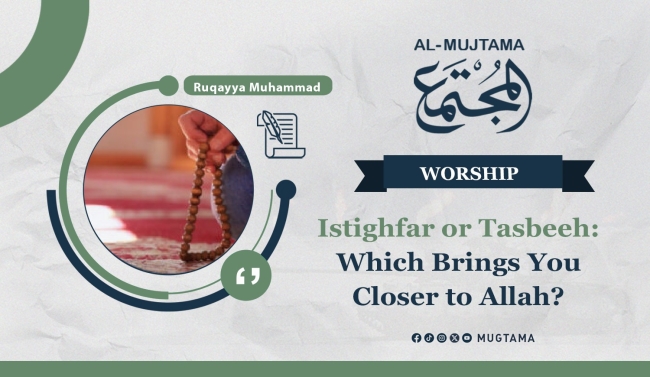Istighfar or Tasbeeh: Which Brings You Closer to Allah?
Worship is the greatest path to bring the servant closer to Allah. It purifies and elevates the soul. Among the greatest forms of worship is the dhikr (remembrance of Allah), which holds great honor despite its simplicity and can be performed in any state at any time. As Allah the Almighty says, “Indeed, in the creation of the heavens and the earth and the alternation of the night and the day are signs for those of understanding. Who remember Allah while standing or sitting or [lying] on their sides.” (Aal-Imran: 190-191)
There are many forms of dhikr, with istighfar (seeking forgiveness) and tasbeeh (glorifying Allah) being among the most frequently mentioned in the divine texts. However, a question that might arise is: which is better, istighfar or tasbeeh? And is there a preference for one in certain situations over the other? This article aims to address these questions.
Definition of Istighfar and Tasbeeh
Istighfar: It is the act of repentance and seeking forgiveness, acknowledging one's sins, forsaking them, feeling remorse, and returning to the path of righteousness. Allah urges His servants to hasten towards istighfar by highlighting the rewards prepared for those who seek forgiveness. Allah says, “And hasten to forgiveness from your Lord and a garden as wide as the heavens and earth, prepared for the righteous.” (Aal-Imran: 133)
Tasbeeh: It is to declare Allah free from any deficiency or imperfection and to attribute to Him all qualities of perfection. Allah commands this in His statement, “And remember your Lord much and exalt [Him] with praise in the evening and the morning.” (Aal-Imran: 41) The specific mention of tasbeeh after the general command to remember Allah highlights its great merit.
Command for Istighfar and Its Virtues
The Quran contains direct commands to seek forgiveness, such as, “So take a straight course to Him and seek His forgiveness..” (Fussilat: 6) Allah also praises those who seek forgiveness in His statement, “And those who, when they commit an immorality or wrong themselves [by transgression], remember Allah and seek forgiveness for their sins - and who can forgive sins except Allah? - and [who] do not persist in what they have done while they know.” (Aal-Imran: 135) The Sunnah also emphasizes the Prophet's diligence in seeking forgiveness, despite his infallibility. Abu Huraira reported that the Prophet (peace be upon him) said, “By Allah, I seek the forgiveness of Allah, and repent to Him more than seventy times in a day.” (1)
The virtues of istighfar are numerous and profound, including the expiation of sins, increase in provisions, and entry into Paradise. Allah says, “And said, 'Ask forgiveness of your Lord. Indeed, He is ever a Perpetual Forgiver. He will send [rain from] the sky upon you in [continuing] showers and give you increase in wealth and children and provide for you gardens and provide for you rivers.'” (Nuh: 10-12)
Greatness of Tasbeeh and Its Virtues
The greatest characteristic of tasbeeh is that it is beloved to Allah. Abu Huraira reported that the Prophet (peace be upon him) said, “Two words are light on the tongue, weigh heavily in the balance, and are loved by the Most Merciful One: Subḥānallāhi wa biḥamdih, Subḥānallāhi ‘l-`Aẓīm. (Glorified is Allah and praised is He, Glorified is Allah the Most Great).” (2) How great it is to come closer to Allah with what He loves! It is a form of dhikr that all creation engages in, as Allah says, “The seven heavens and the earth and whatever is in them exalt Him. And there is not a thing except that it exalts [Allah] by His praise, but you do not understand their [way of] exalting. Indeed, He is ever Forbearing and Forgiving.” (Al-Isra: 44)
The virtues of tasbeeh are immense, including the increase of rewards and the expiation of sins. Abu Huraira reported that the Prophet (peace be upon him) said, “If anyone says a hundred times in a day, ‘Glory be to God, and I begin with praise to Him’, his sins will be removed from him though they are like the foam of the sea.” (3) Tasbeeh also alleviates distress and brings peace and tranquility to the heart. Allah says, “And We already know that your breast is constrained by what they say. So exalt [Allah] with praise of your Lord and be of those who prostrate [to Him].” (Al-Hijr: 97-98)
Which is Better: Istighfar or Tasbeeh?
As mentioned, istighfar and tasbeeh both hold great virtues and have a significant impact on the believer's heart. The preference between them lies in their suitability for a specific situation. Istighfar is more appropriate when the soul needs purification from sins and transgressions, as it is the best means for repentance and drawing closer to Allah. Tasbeeh, on the other hand, is more suitable for affirming faith and glorifying Allah in the heart, as it strengthens the relationship with Allah.
In general, it is recommended that a Muslim consistently engages in both, as they do not contradict each other but complement each other in daily dhikr. As the hadiths indicate, both have virtues that a believer needs.
Therefore, it can be said that istighfar and tasbeeh are both great forms of dhikr, and comparing them in absolute terms is not feasible. Instead, it depends on the Muslim's need for one over the other at a given moment. What is important is for the Muslim to always keep their tongue moist with the remembrance of Allah and to make both istighfar and tasbeeh a regular part of their daily life.
-------------------------------------------------------------
(1) Narrated by Al-Bukhari (6307).
(2) Narrated by Al-Bukhari (6406).
(3) Narrated by Al-Bukhari (6405).


